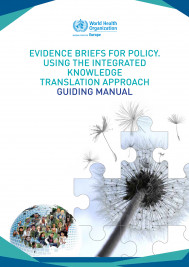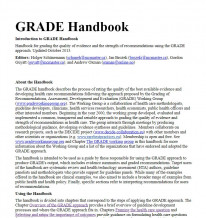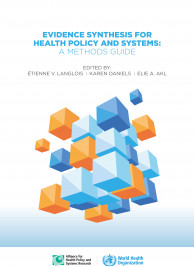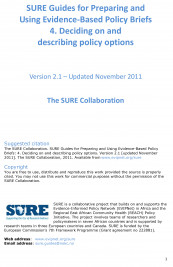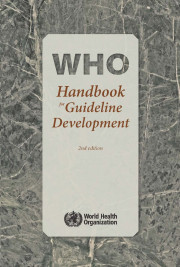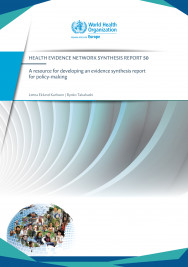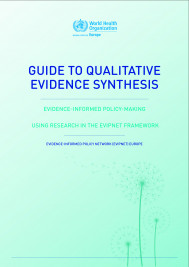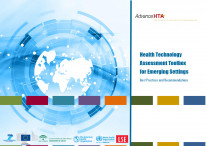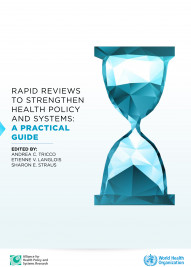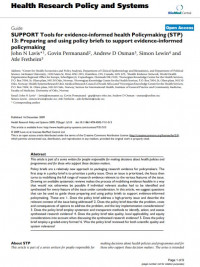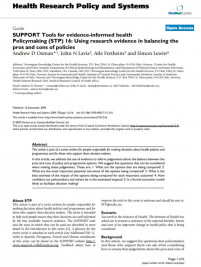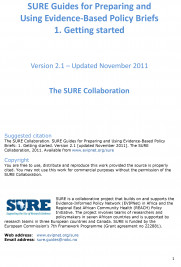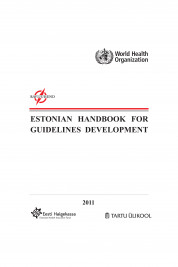Synthesize
Evidence briefs for policy. Using the integrated knowledge translation approach. Guiding manual
Evidence Briefs for Policy (EBPs) are a relatively new, innovative approach to packaging research evidence for policy-makers; however, they are already the most widely used tool. EBPs are prepared by...
GRADE Handbook
The GRADE handbook describes the process of rating the quality of the best available evidence and developing health care recommendations following the approach proposed by the Grading of Recommendatio...
Evidence synthesis for health policy and systems: a methods guide
This methods Guide explores various ways to address the challenges of synthesizing evidence from HPSR including methods and tools to conduct and promote the uptake of evidence synthesis for health pol...
SURE Guides for Preparing and Using Evidence-Based Policy Briefs 4. Deciding on and describing policy options
SURE Guide 4 is part of the SURE Guides for Preparing and Using Evidence-Based Policy Briefs. The SURE Guides are intended for those people responsible for preparing and supporting the use of policy b...
WHO handbook for guideline development
A WHO guideline is any document developed by the World Health Organization containing recommendations for clinical practice or public health policy. A recommendation tells the intended end-user of the...
A resource for developing an evidence synthesis report for policy-making
HEN – the Health Evidence Network – is an information service for public health decision-makers in the WHO European Region, in action since 2003 and initiated and coordinated by the WHO Regional Offic...
COVID-19 Vaccine Introduction and deployment Costing tool (CVIC tool)
The CVIC tool supports credible COVID-19 vaccination costing to facilitate a dialogue with stakeholders, while maintaining sensitivity to protect essential health services.The CVIC tool provides a str...
Guide to qualitative evidence synthesis: evidence-informed policy-making using research in the EVIPNET framework
This guide aims to support country efforts to generate evidence, including qualitative evidence. It summarizes what a qualitative evidence synthesis is, and how it can contribute to the evidence-infor...
Health Technology Assessment Toolbox for Emerging Settings: Best Practices and Recommendations
This toolbox is focused on the use of health technology assessment (HTA) in emerging settings. Its primary audience is&nbs...
Making GRADE the Irresistible Choice authoring and publication platform (MAGICapp)
MAGIC (Making GRADE the Irresistible Choice) is a non-profit foundation with the goal of increasing value and reducing waste in healthcare through a digital and trustworthy evidence ecosystem. MAGICap...
Rapid reviews to strengthen health policy and systems: a practical guide
Policy-makers require valid evidence to support time-sensitive decisions regarding the coverage, quality, efficiency, and equity of health systems. Systematic reviews and other types of evidence synth...
SUPPORT Tools for evidence-informed health Policymaking (STP) 13: Preparing and using policy briefs to support evidence-informed policymaking
This article is part of a series written for people responsible for making decisions about health policies and programmes and for those who support these decision makers.Policy briefs are a relatively...
SUPPORT Tools for evidence-informed health Policymaking (STP) 16: Using research evidence in balancing the pros and cons of policies
This article is part of a series written for people responsible for making decisions about health policies and programmes and for those who support these decision makers.In this article, the use of ev...
SURE Guides for Preparing and Using Evidence-Based Policy Briefs 1. Getting started
SURE Guide 1 is part of the SURE Guides for Preparing and Using Evidence-Based Policy Briefs. The SURE Guides are intended for those people responsible for preparing and supporting the use of policy b...
A Guide for Evidence-Informed Decision-Making, Including in Health Emergencies
This guide aims to bring together the most recent thinking in the EIDM field and to present this in a format that is accessible to a wide audience of EIDM practitioners. It builds on, and contextuali...
Estonian Handbook for Guidelines Development
Clinical practice guidelines are generally accepted as an important tool for improving the quality of clinical care provided by health professionals, as well providing guidance to ensure the quality u...


